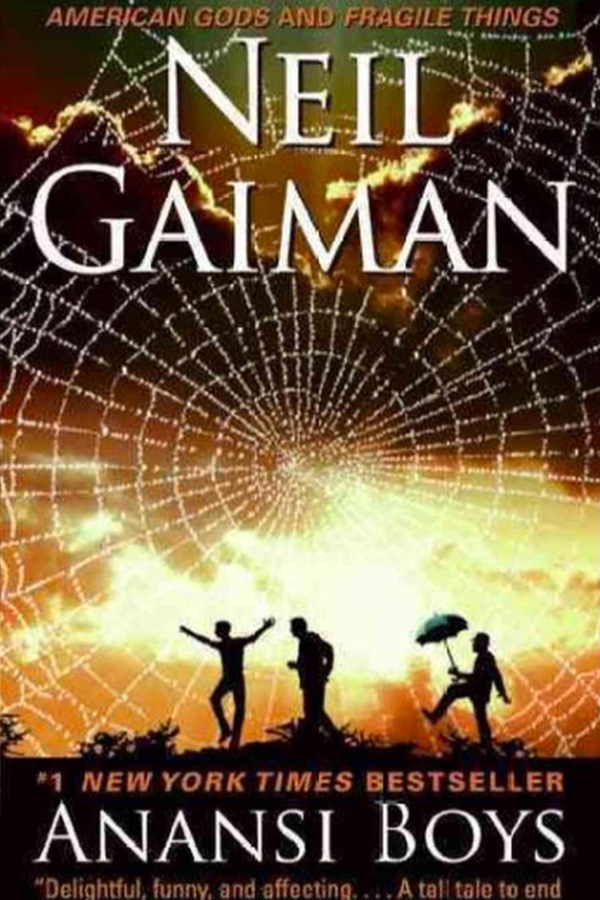Our stories all have ancestors, and those ancestors have stories of their own. The folktales of Br’er Rabbit, for example, are the offspring of a fortuitous encounter between two oral traditions, complete strangers to each other. Those two strangers were the Ghanaian and Cherokee cultures, who met, to put it in a trivial metaphor, on a cruise in the Caribbean and found they had so much in common that they got together and had a baby. That love-child was raised by its devoted parents in the Caribbean and North America, and gave birth in turn to the personae of Uncle Remus and his various animal brethren.
Back in Ghana, though, the granddaddy of all those beloved characters continued to spin his own tales. The ancestor of the Br’er Rabbit stories was the trickster god Anansi, the Spider, and it is he who provides the mythological foundation for Neil Gaiman’s fantasy tale, The Anansi Boys.
It is the story of a young man named Charles Nancy. His father, whose identity should come as no surprise, given the surname and book’s title, bestows on his son the nickname “Fat Charlie,” even though there is no discernible connection to Charlie’s physical avoirdupois. (I actually knew that word before I looked up the spelling. So proud of myself.) Everyone calls him by that name, including the narrator. He is in London, trying to marry a sweet and practical girl named Rosie, trying not to be identifiably States-side, and trying to stand up to his assertive boss (an odious creep) and his impending mother-in-law (not creepy, just assertive).
Fat Charlie’s father dies— well,sort of — in an embarrassing fashion, and Fat Charlie tries to free himself, thankfully without success, from all the embarrassing memories. As he tries to make his escape after the supposed funeral back in Florida, the three old ladies who live down the block tell Charlie that his dad was a god, and that he should talk to spiders if he needs help. They know more than that, which should come as no surprise. They also know how to do some interesting things with small and specific pieces of dirt.
In an impulsive moment brought on by wine, too much pizza, and a sense of inefficacy, Charlie talks to a spider in a bathtub, and then…. can’t ruin it for you, but the satisfaction and surprise factors complement without outdoing each other or overdoing the book. The no-spoiler version is that Charlie’s long lost brother starts taking over his life, various conspiracies and hidden mysteries unfold, and then we run off to the Caribbean (not-so-coincidentally, the place where Ghanaian Anansi begat his first Western Hemispherical stories). There, on a tropical island, we defeat evil animal monsters in a dark dank basement! Yessss!
The sentences are delicious, the mythology has, to my Anglo-Greco developed palate, a unique and welcoming flavor. The structure is a bit choppy, but choppedness does well in some salads, and this salad is worth a taste. The female and male characters all have strong and important roles to play, and no one is demeaned or dismissed. Even the odious creep has his page time, and he definitely gets what he deserves in the end.
This book is a true descendant of its ancestors. It is a folk tale and adventure story, simple and uncomplicated, where you have to do x and y to get to the end of a quest. In this case the quest is like that of Pearl, Telemachus, David Balfour and countless classic and modern protagonists. They are all looking for a father figure. This is such a impressively consistent literary theme that I’ll venture onto what isn’t really a sidetrack. Ever wonder why so many notable fictional characters across so many centuries are orphans? Pick ’em. King Arthur, Oliver Twist, Jane Eyre, Tarzan, Mowgli, Heidi, Quasimodo, Huck Finn, Anne Shirley, Prince Caspian, Dorothy Gale, Pollyanna, Batman, Superman, Spiderman, Harry Potter, Luke Skywalker and Rey (may the Force continue to be with her), every Disney princess ever …. I’m scratching the surface, and do read the books and see the movies. But Fat Charlie Nancy has a father. And he finds him, sort of and definitely. You’ve got to go on the quest to figure out what that means.
You’ve been waiting too long for the cautionary bits, those annoyingly large pieces of onion in the chopped salad, so here they are. The story has some instances of what is called mild language, some non-sexual partial undress, an implied sexual encounter, and morally ambiguous Loki types escaping with a chuckle and few consequences. Incidental blood also happens, as it is prone to do in most scrapes. Some voodoo-ish magic and the presence of mythological deities presented as real and powerful might be bothersome, but then again, this is the descendant of a mythology or two, and might be excused for honoring its forebears. The other cautionary bit, which I will supply on demand, is that I love speaking dramatically, so feel free to add as many grains of salt as will season the offering to your taste. The whole thing is right for the right audience. I suppose that can be said of any good book, and this is a good book.
Discussion Questions
- Whom does Charlie learn from over the course of his adventures?
- What does Charlie learn?
- Who is, in your opinion, the best character in the book, and why do you think so?
- Did you give examples from the text to support all your answers?



